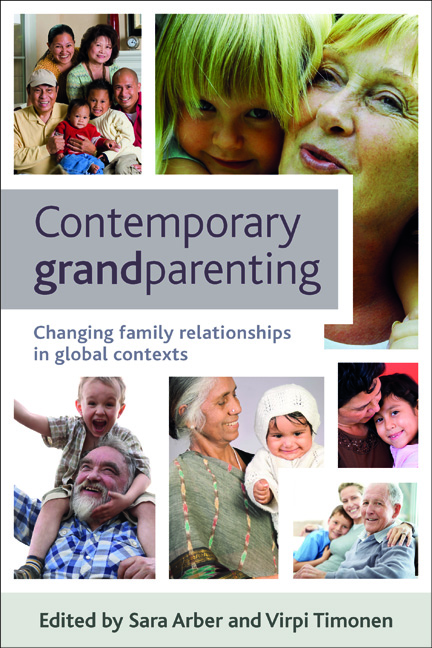four - Grandmothers juggling work and grandchildren in the United States
Published online by Cambridge University Press: 01 September 2022
Summary
Introduction
We tend to think of balancing work and family as something that only relatively young families contend with, yet many middle-aged grandmothers are employed and providing routine childcare for their grandchildren. Grandmothers are highly prized daycare providers because the quality is often high, the cost is often very low, and the flexibility is often maximal (Wheelock and Jones, 2002). Indeed, many young working families report that they feel that the best possible care providers for their children would be the grandmothers. Grandmothers may agree, but as the age at retirement increases with economic necessity, many grandmothers are feeling more of a pinch between paid and unpaid work (Simon-Rusinowitz et al, 1996; Wheelock and Jones, 2002; Turner, 2005; Park, 2006).
The US literature suggests that while grandfathers provide some care for grandchildren, grandmothers are a more central component of the childcare system. As many as 43% of grandmothers care for grandchildren regularly, and 20% of children with working mothers are regularly cared for by their grandmothers (Baydar and Brooks-Gunn, 1998). But these studies do not clarify whether the grandmothers are also employed and therefore juggling paid and unpaid work. There is an enormous literature on balancing work and family in the younger stages of the life course, but the literature on the impact of balancing work and family among grandparents is thin and its findings are mixed.
Caring for grandchildren while employed may affect economic security, physical and emotional health, social relationships, and the capacity to care for other family members. But the direction of the impact on grandmothers appears to be quite mixed: some fare well while others struggle (Platt Jendrek, 1994; Moen et al, 1995; Nelson, 2000; Turner, 2005). The impact may vary by race, class and marital status (Pruchno, 1999; Kataoka-Yahiro et al, 2004; Park, 2006). Caring for grandchildren may have many positive effects on grandmothers, including better physical and mental health, feelings of being needed and useful, and a very active and involved social life (Presser, 1989; Nelson, 2000; Turner, 2005). But it may have negative effects when grandmothers reduce employment hours, worry about financial implications, provide care for younger and older generations, and feel more stress and burden (Presser, 1989; Platt Jendrek, 1993; Landry-Meyer and Newman, 2004; Musil et al, 2006; Ludwig and Winston, 2007; Wang and Marcotte, 2007).
- Type
- Chapter
- Information
- Contemporary GrandparentingChanging Family Relationships in Global Contexts, pp. 71 - 90Publisher: Bristol University PressPrint publication year: 2012



